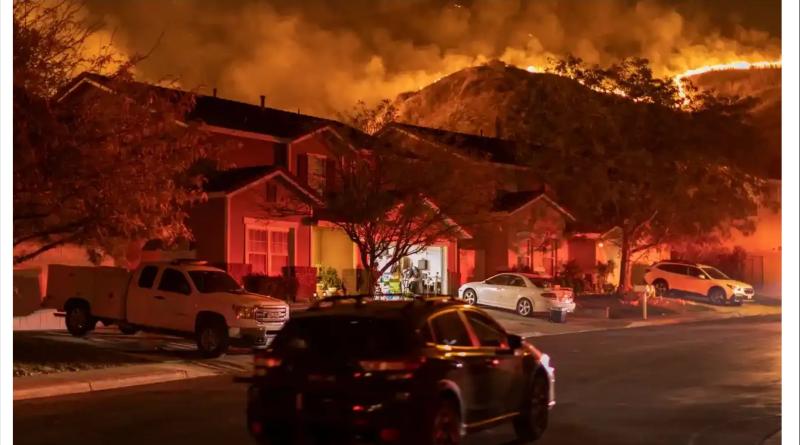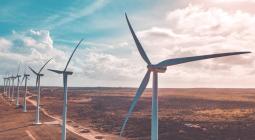This Is the Extinction Economy — Some of Us Just Don’t Know It Yet

There are headlines, and then there are headlines. I was scanning the news this morning, and this jumped out and slapped me right in the face:
The insurance giant State Farm, America’s biggest car and home insurer by premium volume, will halt the sale of new home insurance policies in California, citing wildfire risk and inflation of construction costs.
Starting on Saturday, the company will not accept insurance applications for business and personal lines property and casualty insurance.
Whew. Sound like a big deal? It should. If it doesn’t, let me translate it. The biggest insurance company in the world’s richest country won’t insure homes in one of its richest states going forward. Why? Because…climate change.
Let me put that to you in even simpler form. California’s becoming uninsurable because of climate change. Now, there will be plenty of people who’ll want to “debate” that. Hey, don’t “debate” it with me. What is there to debate? It’s a fact. An empirical truth. It’s hard to accept, because we don’t talk about it enough, in these terms, because having both-sidesed the issue, the average person might still think, “hey, it could go either way!” LOL, meanwhile…in reality…California’s becoming uninsurable…and it’s only 2023.
Welcome to the Extinction Economy. Like I said, that’s a big deal. It barely made the news, but it should have been all over the place. Because to the economist in me? That’s like a nine-alarm fire going off. Why? Well…come on. The biggest insurance company in the country can’t absorb the risks of climate change. And we’ve barely even begun to experience it. It’s just 2023. That is how dire shape we’re in. Our systems already can’t cope.
Let’s discuss this at micro and macro levels.
What happens at the micro level — the level of, say, home ownership? Well, it’s hard to get a mortgage — maybe impossible — without insurance. So this is going to limit credit, because now of course the pool of insurers is smaller, and those who are left will charge more. Bang, house prices rise — and the pool of people who can aspire to own them gets even smaller, because getting insurance is going to be a much, much more difficult proposition. Every day, month, year. State Farm came out and said it: we can’t absorb the…wildfire risk.
Whew.
But what’s really going on here, why this is notable, is the macro level effect. What does it mean when the largest insurance company in the country, one of the biggest in the world, can’t absorb risk…like wildfire risk? It means that climate change is already enough of a risk that our systems — in this case, our financial systems, of which insurance is a part — can’t cope with risk this big. Because this is civilizational risk. Mega risk. State Farm is saying hey, we can handle a few hundred homes burning down a year, maybe even a few thousand here and there. But from now on? More and more homes, entire towns, just being incinerated? Sorry, we’ll go broke…fast. Nobody will reinsure us. The business doesn’t work anymore. The institution doesn’t work anymore.
The Extinction Economy is now hitting people with a triple whammy. We economists are doing a pretty terrible job explaining it to them, because in my field, there’s little understanding of climate change, extinctions and how it affects economics. Most central bankers — the guys that run our economies — have no opinion, meaning, they haven’t even thought about it, LOL. So let me explain the triple whammy, and why it’s…worrying.
Effect one. Prices are skyrocketing — disproportionately for basics, especially food — because of climate change. Harvests are beginning to fail, we’re becoming a water-poor civilization, and we don’t know how to produce agriculture without fossil fuels. Meanwhile, as the temperature heats up, the effects on irrigation and farming are disastrous, around the globe, from Kansas to Spain to India to China. And the average person’s seeing now the direct effects of that. Skyrocketing food prices are about half greedflation, sure, but that greedflation can exist because there are real shortages at work here, climate change affecting the price of nearly every kind of food commodity there is, from coffee to maize to sugar.
That’s effect number one. Number two is what happens as a result of this. Interest rates go up, to try and “control” skyrocketing prices. Never mind that this is a fools’ game — higher interest rates don’t make it easier to plant a single seed, they just make it harder, by raising costs for debt, for working capital, for everything that a farm needs, really. But because central bankers don’t care to think about climate change — they don’t acknowledge it at all, it’s not part of the formal models that they run to predict how economies do, and base their decisions on — they just keep on raising rates. And everyday people pay the price, because having gone deeper into debt to afford those skyrocketing basics, now, there’s a double whammy: the price of debt goes up, too. Interest rates for credit card, car payments, mortgages, everything — they all surge. Bang, people get poorer.
Effect three is what we just saw happen in California. A place becomes uninsurable. And that creates a whole new level of problems. Because now, well, you’re paying more for basics, like food and water and energy, and you’re paying more for debt, to afford them, and now…bang…just like that…maybe you can’t get insurance. Where does that leave you? If you’re a homeowner, an unlucky kind, it leaves you with what we call in economics “stranded assets.” Now maybe your home’s declining in value, since you can’t sell it because nobody will insure it, and…you’re stuck.
This is the Extinction Economy. That triple whammy. That’s a very good way to think about what happens over the next decade. And doesn’t stop happening. There’ll be temporary resets here and there, seasonal ones, to be sure. But over the long run? The tea leaves are very, very clear. Prices rise, as we hit planetary boundaries, and can’t produce more basics. Interest rates rise, or stay stuck at fairly high levels. Central banks don’t know what do, because they won’t even make an effort to understand the basic issue here. And slowly, as temperatures rise, and mega-weather increases, places become uninsurable. That means that more and more people are stuck with stranded assets. Towns, cities, regions become stranded assets.
What do stranded assets do? They strain social contracts, of course. If you used to be a perfectly nice town or city, with a buzzing economy, you contributed to the public purse. But if you’re an incinerated wreck every summer, you don’t. You take from it, because of course the insurer of last resort is basically the state. So the state rolls in, does what it can to bring your town back to some semblance of normal, maybe every summer — but that costs everyone else a pretty penny, all that reconstruction. There’s less left over for all the other failing systems — education, transportation, water, energy — in society. The vicious cycle of ruin accelerates.
If that sounds bad, that’s because it is. You see, I talk about this stuff a lot. And you’ve become used to hearing me talk about it. Flip it on its head. Think about how strange it is that you never hear any of my fellow economists — even those with big columns and whatnot — ever talk about it. Ever. Think about how weird it is that all this is happening — right before your eyes — and literally nobody much in economic power seems to care. Shouldn’t…Janet Yellen…the Secretary of the Treasury…Jerome Powell…the Chair of the Fed…shouldn’t Larry Summers…all these incredibly powerful people…be concerned…when the biggest insurance company in the country says California’s becoming uninsurable? That it won’t insure homes anymore?
Of course they should. But they ignore the issue. It’s baffling and amazing to witness. History will regard it as a case of denial on a staggering, unholy scale. But here we are. It’s incumbent on the rest of us, then, to really grasp what’s happening. To us, to our societies, to our economies.
That doesn’t mean — when I say Extinction Economy — Hollywood style sci-fi. Mom, Umair said five hundred foot high tsunamis are going to wipe out the human race…on Wednesday! And it’s already Monday! I’m not saying anything of the sort. I’m saying…what I just said.
This is the Extinction Economy. It’s already here. It’s happening before our eyes. Right now, it’s a slow burn. But it’s accelerating. And because we’re conditioned not to talk about it, we don’t. When we see figures like Janet Yellen or Larry Summers or Jerome Powell…and they don’t utter a word…when the biggest insurer basically says, sorry, we can’t insure California anymore…we conclude, hey, it must not be a very big deal! Nothing to worry about, here, folks. Surely all these brilliant and powerful people would have something to say if there was something to worry about, right?
And so the Extinction Economy just creeps in, all around us. By now, it’s more and more of the economy. It in your skyrocketing grocery bill. It’s in your soaring utilities bills. Interest rates at eye-watering levels. It’s in declining real incomes. In the falling living standards all those produce. It’s in town, regions, cities…now entire states…becoming uninsurable.
How much bigger does it have to get before we notice it? Let me try to emphasize the point, because, well, if I sound a little miffed, maybe I…am. When California becomes uninsurable, my friends, it’s a big deal. Not because I love California, I don’t, I’m a Southerner through and through, sorry, not sorry, bury me in my cowboy boots. But because that is how big the Extinction Economy is. How much it’s affecting us. How real it is.
It doesn’t do us any good to go on pretending. Just because our leaders, figures in power, don’t seem concerned — doesn’t mean we shouldn’t be. That’s just another kind of failure. Nor should our concern be caricatured — nobody is saying everything’s going to be swallowed up by the sea. But you can see how fast our economy is changing now. And how much even that change is accelerating.
If I told you a decade ago that California would be uninsurable — not to me, not in my opinion, but to the largest insurance company in the country — would you have believed me? And yet here we are.
This the Extinction Economy — only some of us just don’t know it yet.
Umair
May 2023





